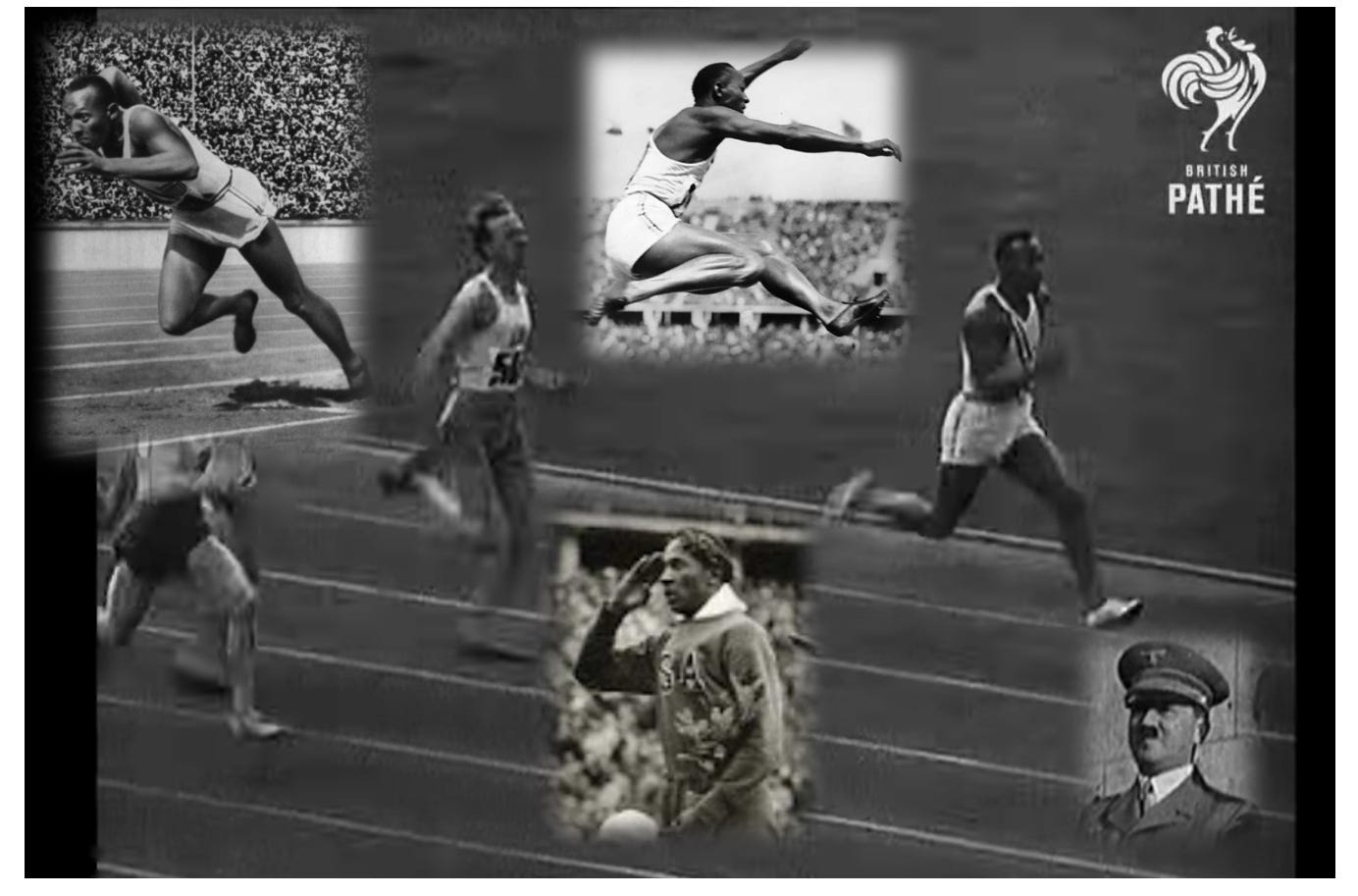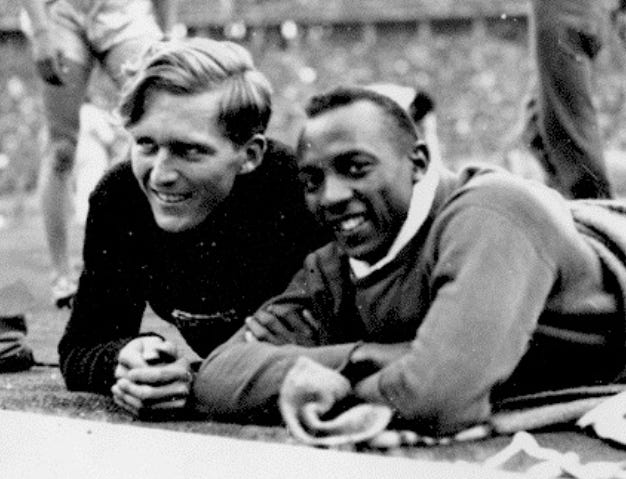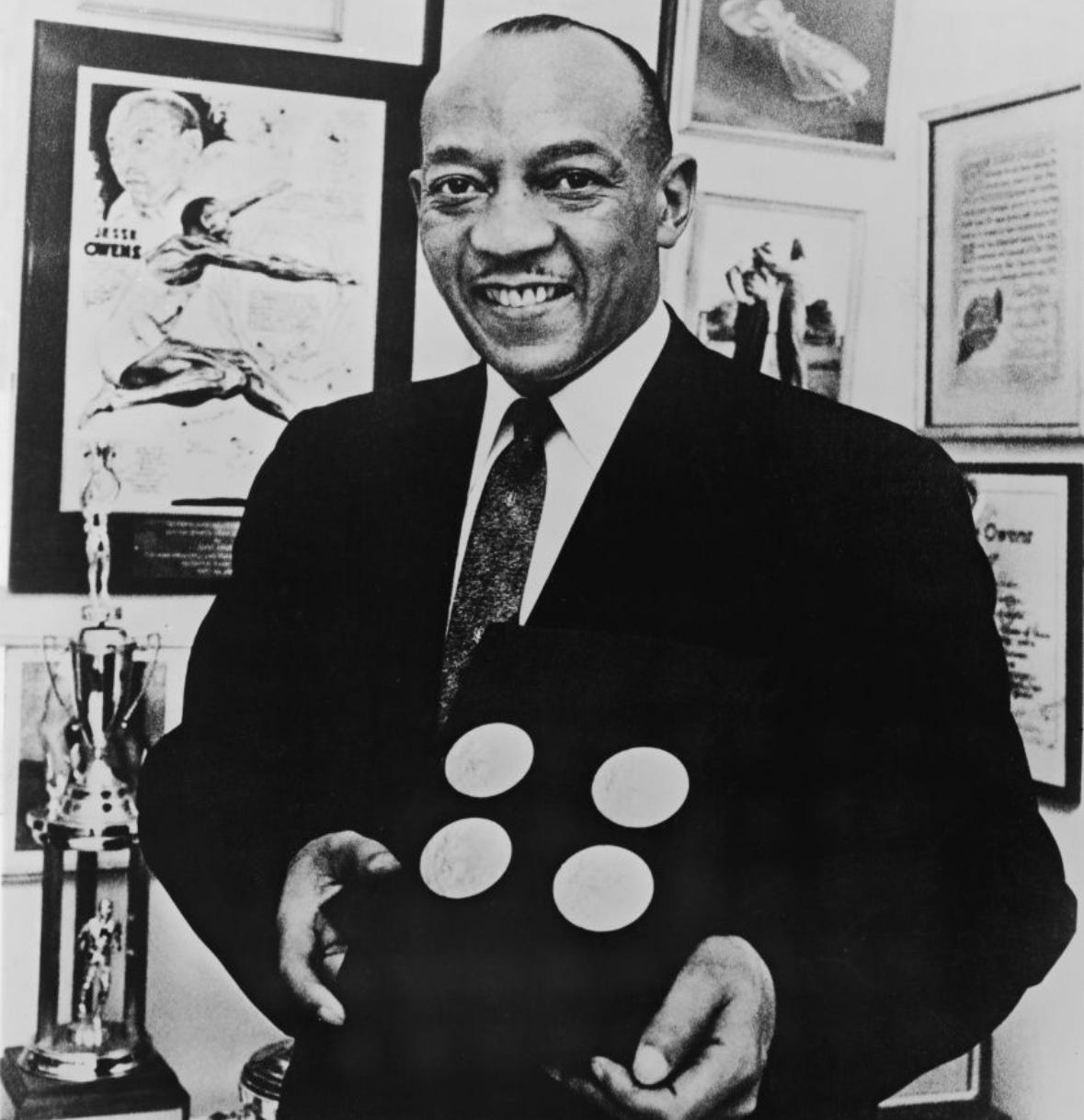“The world’s most superb runner [Jesse Owens] makes the others look as if they’re walking, as he wins the final and equals the world’s record time.” —1936 Olympics announcer
“This was the guy that tweaked Hitler's mustache. This is the guy who showed the master race they were the minor race. Jesse Owens was an authentic American hero from then on.” —Jim Murray, describing Owens’s historic 1936 Olympics performance
There are so many inspiring, beautiful stories about the great heroes of American history which are scarcely ever told. One happens on them accidentally—buried in a thick, out-of-print biography, in small print on a museum sign, casually and fleetingly mentioned in an obscure educational video. America cannot return to greatness in the future if we do not truly understand the greatness of our past. That is why I am writing an article series to tell a few of these little-known but moving or illustrative “untold stories” of American greatness. Other articles in this series include Mitchell Paige, the Marine who stood alone against thousands of Japanese at Guadalcanal; Bing Crosby’s WWII letters to troops and families; the Jewish family that gave Louis Armstrong his first instrument; Medal of Honor recipients who gave the last full measure of devotion; and Al Jolson, “The Jazz Singer,” and the first “talkie” movie.
Since today is the 88th anniversary of an historic August 3 Olympics race, and since the blasphemy and perversion of the current Paris Olympics have made many Americans nostalgic for the past, I am going to talk about one of the greatest American Olympians: Jesse Owens.
Swastikas waved overhead and the Nazi anthem blared as Nazi troops goose-stepped into the Berlin stadium. A young black American athlete, a sharecropper’s son and slave’s grandson, stood ready to run the 100 meter dash as the hordes of white supremacists arrogantly marched and cheered in all their glory, and a dictator who would go on to be one of history’s greatest mass murderers took his seat. “Heil Hitler!” echoed through the air as America’s Jesse Owens prepared to run for gold.
Yahoo! Sports, via the Deseret News archive, notes that Jesse Owens had already garnered some fame and glory even before his historic Olympics performance, in spite of a tailbone injury: “Specializing in the sprints and long jump, Owens set three world records and tied another at the 1935 Big Ten Conference track meet in 1935 and he did it in 45 minutes.” To this day, Owens’s performance is known as the “greatest 45 minutes in sports history.” He was a sophomore at Ohio State at the time. ESPN adds, “In his junior year at Ohio State, Owens competed in 42 events and won them all, including four in the Big Ten Championships, four in the NCAA Championships, two in the AAU Championships and three at the Olympic Trials.” But his most famous achievements were yet to come, in Berlin, at the Nazis’ 1936 Olympics.
The swastika flags, the goose-stepping storm troops, the “Deutschland Uber Alles” anthem, and the salutes to Nazi Fuhrer Adolf Hitler were the backdrop, ironically, for the humiliation and defeat of Nazi ideology, several years before World War II began. “I remember seeing Hitler coming in with his entourage and the storm troopers standing shoulder to shoulder like an iron fence,” Owens said, recalling his experience in the Olympic Stadium, per ESPN. “Then came the roar of 'Heil, Hitler!' from 100,000 throats. And all those arms outstretched. It was eerie and frightening.”
Jesse Owens ran the 100m and won the gold medal. Adolf Hitler reportedly fumed as the young American took the first spot on the podium during the medal ceremony (though Hitler and Jesse did exchange “friendly” waves later). Jesse Owens was on his way to being one of the most iconic athletes in history. He would solidify that fame by winning a total of four gold medals at that Berlin Olympics.
The Pathe Gazette report showed Owens’s race (watch below) as the announcer said, “After the fanfares of the Olympic opening comes the most amazing performance by America’s black streak Jesse Owens in the 100 meters. The world’s most superb runner makes the others look as if they’re walking, as he wins the final and equals the world’s record time. This and his later victory in the long jump may well be the athletic performances of the century.” That announcer seems to have been prophetic.
James Cleveland “Jesse” Owens had experienced the harsh realities of racism back in the United States, but that was on a different scale than the overwhelming Aryan pride and insanity of the Nazis. “In Germany, the Nazis portrayed African-Americans as inferior and ridiculed the United States for relying on ‘black auxiliaries.’ One German official even complained that the Americans were letting ‘non-humans, like Owens and other Negro athletes,’ compete,” ESPN notes. Owens, fellow runner (and a great athlete in his own right) Mack Robinson, and others showed up Nazi ideology and went home with medals. (It is noteworthy that two Jewish U.S. runners were removed last-minute from the relay team at the Olympics, and it is still debated if the Americans made the decision based on skill alone or to avoid offending the Nazis. Jesse Owens, one of the replacements, objected to the decision at the time).
Read Also: Untold Stories: Mack Robinson, Groundbreaking Black Athlete and Born Winner
Of course, not every German was racist. According to ESPN, “Crowds of 110,000 cheered [Owens] in Berlin's glittering Olympic Stadium and his autograph or picture was sought as he walked the streets.” And Carl “Luz” Long, the German long jumper who lost gold to Jesse at the Olympics, proved a lasting friend to Owens. Long and Owens walked about the Olympics arm-in-arm, and Long continued to admire Owens, sending his final letter to his “brother” Jesse while he was serving in the WWII German army, soon before his death.
[Yahoo] [Owens] won the 100 meters, followed it up with gold medal victories in the long jump and 200 meters, and was a part of the 4X100-meter relay squad that swept the gold. Historians have credited Owens, as a Black American, as the … man who “single-handedly crushed Hitler’s myth of Aryan supremacy.” He and his teammates — including Ralph Metcalfe, Archie Williams, John Woodruff and Cornelius Johnson — won 12 gold medals in track and field.
While other black athletes like Mack Robinson also helped to humiliate Hitler, the number of gold medals “America’s black streak Jesse Owens” won impressed the world.
Owens almost didn’t qualify for the long jump, but a timely piece of advice from his German competitor Luz Long helped him, and Owens went on to take gold in that event, too. “It took a lot of courage for him to befriend me in front of Hitler,” Owens said later of Long. "You can melt down all the medals and cups I have and they wouldn't be a plating on the 24-karat friendship I felt for Luz Long at that moment.” Long recognized a great athlete and a great man in Jesse Owens.
Unfortunately, not all Americans were as open-minded as Luz Long had been, and Owens did not go home to quite the hero’s welcome he deserved. There were those, of course, who admired him, but full civil rights for black Americans was still years in the making. “When I came back to my native country, after all the stories about Hitler, I couldn't ride in the front of the bus,” said Owens of his homecoming. “I had to go to the back door. I couldn't live where I wanted. I wasn't invited to shake hands with Hitler, but I wasn't invited to the White House to shake hands with the President [FDR], either.” Racist Democrat Franklin Roosevelt only invited white Olympians to the White House, something Owens never forgot.
But, like his fellow Olympian Mack Robinson (and unlike much more privileged modern athletes such as Simone Biles), Owens was not a complainer. He believed that he could make his country and his world a better and fairer place. It was his job, he said, “to try to make things better.”
[ESPN] Upon Owens' return to New York and a ticker-tape parade, he had to ride the freight elevator to a reception in his honor at the Waldorf-Astoria. He was treated as a kind of curiosity. When endorsements didn't come his way, he made money by, among other activities, running against horses and dogs.
“People said it was degrading for an Olympic champion to run against a horse, but what was I supposed to do?” Owens said. “I had four gold medals, but you can't eat four gold medals.”
Not until the fifties did he achieve financial security, becoming a public speaker for corporations and opening a public-relations firm.
In a 1950 Associated Press poll, he was voted the greatest track and field star for the first half of [the] century, outpolling Jim Thorpe by almost three to one.
President Gerald Ford gave Owens the Medal of Freedom in 1976, America’s highest civilian honor. Jesse had come a long way from his childhood of bad health, cotton picking, and poverty. He had overcome foreign and domestic racism to become an adored icon. The young Olympian who humiliated Hitler and exposed the foolishness of a hateful ideology became one of the most admired athletes in history, because he was not only a phenomenal athlete—he was also a great man.







Thank you, Catherine for reminding us of, and giving the great Jesse Owens the honor and remembrance he so deserved.